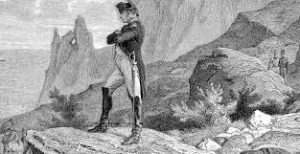A battle of reputations
Napoleon’s reputation is the result of many books written since his death in 1821, particularly by individuals who found a way to make money from his story. These have been many and varied and some correspondents wrote their highly embroidered version of events even before Napoleon was dead.

There have also been many pictorial depictions of Napoleon in exile on St Helena that have him gazing forlornly out to sea – no doubt dreaming of rescue from exile and restoration to his throne.
These literatures have come from disaffected individuals who served on the island during the time of Napoleon’s exile and who wrote for political and monetary gain. One of the most prominent of these was the account by the Irish doctor, Barry O’Meara, the naval surgeon. O’Meara returned to England and published a scurrilous and inaccurate account of his time on St Helena that was entitled A Voice from St Helena. The book became an instant best seller and caused the Government no end of political trouble.
Less problematic at the time, but of great significance since, have been accounts by members of the Balcombe family, most notably by Betsy, William Balcombe’s daughter, who wrote an account of her experiences on St Helena at the time of Napoleon’s imprisonment entitled Recollections of St Helena. This drew a sympathetic picture of Napoleon with descriptions of his daily life in exile and his social inter-actions, including his gardening activities.
In the modern era, Balcombe’s great grand-daughter, Mabel Brookes, carried out extensive research in Australia, and on the island, before writing The St Helena Story, another account sympathetic to Napoleon and Betsy and antipathetic to Sir Hudson Lowe.
Other influential accounts included the diary kept by Sir Hudson Lowe’s military secretary Major Gorrequer, who wrote a daily record of events in code that was disobliging towards the Governor and, in particular, his wife.
French accounts written by members of Napoleon’s suite and household after they had returned to Europe following his death, were universally sympathetic to Napoleon.
The overall impression left by the literature is that Napoleon’s actions whilst in exile had been exemplary and that the British had behaved damnably.
Legacy on St Helena
 Napoleon’s exile and death on St Helena has continued to be of absorbing interest to many throughout the world. His charismatic personality; his extraordinary career and his problematic end, have all contributed to the myths and legends that surround him.
Napoleon’s exile and death on St Helena has continued to be of absorbing interest to many throughout the world. His charismatic personality; his extraordinary career and his problematic end, have all contributed to the myths and legends that surround him.
There are many monuments to Napoleon’s exile on St Helena and visitors from France continue to visit the places where he lived and visited.
Many of the defensive works remain including gun emplacements and cannon on the headlands and beaches. As a gesture of goodwill, Longwood House was transferred to French ownership in 1858 in perpetuity and other key locations associated with Napoleon’s imprisonment are kept in good repair.
The island’s use as a place of exile did not end with Napoleon’s death. King Cetshawayo was imprisoned on St Helena during the Zulu wars and over 5,000 Boer prisoners were kept there in the Second Boer War.
The importation of slaves was banned in 1792 and slavery was abolished in 1792, six years before the Houses of Parliament passed its first Anti-Slavery Act in 1833. Between 1840-1849, the Royal Navy’s anti-slavery squadron was stationed on the island and 15,000 freed slaves were landed there temporarily.
The governance of the East India Company was ended in 1833 and the island became a Crown Colony. St Helena is now a British Dependant Territory with its own Governor, Commander-in-Chief and elected legislative council.
The production of flax for export became St Helena’s principal commercial activity in the mid-nineteenth century until synthetic materials became popular and the trade ended.
Nowadays the main occupation of its c. 4,500 inhabitants is tourism.
Even from the distance of two hundred years since Napoleon death, historians continue to dispute Napoleon’s legacy both on and off St Helena. His was a very human story of triumph and disaster, of hubris and nemesis and the final judgement of his record lies many years away.

